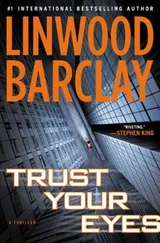“I don’t think so,” she had said.
“Really?”
“Yes, really. ”
And he had said, “All right, look, if you don’t like this, if your delicate psyche can’t handle it, then don’t do it. But don’t make me feel like I’m exploiting you or I ought to be ashamed. Because I’m not.”
“My psyche isn’t delicate. You’d just like it to be. It gives you a better speech.”
Lee knew what to do with the you-and-your-delicate-psyche tack, how to turn it around, but Linda’s expression had already morphed into something else, something Lee was less familiar with.
The only other time Linda had looked at her this way was when they took their golden retriever, Fred, to be put down. Lee, twelve, had acted surprised that Linda had decided to go at all, instead of sending Fred off with a staffer. Her mother indulged the act, she let Lee be superior and indignant. Linda cried but didn’t fall apart and Lee, bereft and angry, had understood, however dimly, that Linda’s show of strength was for her benefit, so that she could fall apart and have a mother who would be there to put her back together. And Linda did — for the rest of that day. Instead of going home, where everything would remind them of Fred, they went to the Beverly Wilshire hotel (no Chateau Marmont scuzziness at a time like this) where they put on robes and ordered room service and got into bed and watched All About Eve (Linda’s choice) and Meatballs (Lee’s). Lee never had another dog. She probably ought to get one now.
“I’ve been waiting for you since your call,” said Linda. “After you saw Charlie Flintwick. Do you believe her? Whatever Marion told you?”
“I don’t think she’s lying.”
“You’ve always had good judgment. Your judgment is unerring. What gets you in trouble is that you don’t trust it. That’s probably my fault. I didn’t encourage you enough or something. I knew where this would lead, you going on this. . quest. I knew it was only a matter of time. I’ve had thirty years to figure out what to tell you but I’m still not sure what to say. Marion isn’t lying. I don’t know that I would trust her memory entirely, but she isn’t lying.”
“I want to hear it from you.”
“Where would you like me to start?”
“Oh, I don’t know. The beginning?”
Linda shook her head, as if she couldn’t believe she was about to do this, but also, surprisingly, as if she admired her daughter. Rather like the way Patti Driggs had looked at her. As if she hadn’t quite thought Lee had it in her. As if Linda saw some of herself in her child.
i love you more than anything Linda, 1978
At Hirschman’s there was a waiter named Robert Rothman. What she had liked about Robert was that he drove fast; they flew down roads in the dark in his Ford Galaxie. He had thick black hair, and he called her darlin’ in an already retro Elvis Presley kind of way. “Whoa, darlin’, where’d you learn that ?” But he listened to folk music, like everyone else then, and also some soul records that spoke to a sensitive, anti-establishment streak in him. But not too strong a streak because in September, Robert would be off to Bucknell, pre-med. At sixteen, she might not have been able to articulate it, but she knew that Robert was challenging the values of a culture in the way a child challenges its parents — to make sure that at the end of the day they were still there, firmly rooted. The disdain that Linda was already developing for her own middle-class upbringing somehow felt more dangerous than Robert’s because it was more detached from any overarching, idealistic principle, more manipulative and self-serving.
Sometimes Linda wondered about her scruples. How she could look down on her father. He would have done anything for her and somehow that wasn’t enough. Big Mort, in his extravagance, booked Linda and her older sister, Lori, their own large room at Hirschman’s, with two double beds they would sneak out of at night, Lori to see her swim instructor and Linda to the cabins behind the dining hall where Robert and the rest of the waitstaff lived. Big Mort. Never to his face, though. Always Daddy to his face. She let him down again and again, and he loved her unconditionally.
She had been thinking about Robert Rothman and those summers at Hirschman’s while she drove from her parents’ house up to Flintwick’s studio to see Jesse. The thick-ankled women in costume jewelry and the Borscht Belt banquets of her adolescence. It startled her how at home she felt on these roads, like being in a dream, a place your mind conjured so you know the landscape and you know what comes next. All those winding country and mountain routes she’d taken in from the back seat of Big Mort’s Cadillac and then the front seat of Robert’s car. She felt girded by the advantage of being on home turf. She needed to be self-possessed when she saw Jesse, not desperate or angry or scared or sad. Or she would be all of those things but self-possessed enough not to show it. Certainly not in front of Marion. Marion made Linda feel old, worthless, and unseen. It was the first time in her life she had felt that way, and it shocked her.
Jesse wasn’t expecting her, but she knew what he was going to say. Let’s settle this. Finalize it, formalize it, whatever his attorney was advising him to do. You’d think Linda would be the one with representation. If not a high-powered, corner-office-in-a-glass-tower lawyer, then some friend of the family, a Big Mort associate. But it was Jesse who saw to these things, whose sense of tidiness, propriety, and manners always lay beneath the careless rock-and-roll surface of his life. (Probably why he had so much trouble with drugs. They were an escape for him, a way to lose control and reorder his mind, whereas for Linda they remained recreational. Linda had dropped acid the way her mother played bridge. And speed had been lovely but then it got to seem like a lot of work. Cocaine, when it came along, was wonderful for parties. Heroin she just never ever touched.) It always surprised Linda that Jesse was neater than she was, that he cared about housework. That’s what Patti Driggs didn’t get in her hateful profile, painting Linda as the dazed yet doting wife. A foolish woman in a ridiculous scene of 1950s domesticity transplanted to 1970s post — sexual-revolution California. What Patti Driggs didn’t get, or didn’t care about, was that Linda wasn’t a good wife in that sense. Linda’s disheveled yet stylish look was an embodiment of the way she approached the world. She didn’t wear any old thing, she had a method, a vision, but she also never thought too hard about it.
As she drove, she thought how Jesse was a better lover than Robert Rothman or any of the other men she’d been with. She loved him. He was sexier than any of those other men. God, he was sexy. He was so sexy that she still wanted him, even when he would unload the dishwasher (before they hired a housekeeper) in a fed-up, put-upon pedantic way. It’s not that hard, Linda, to stack the plates that match and put them in the cupboard. Could you try it just once? Patti Driggs had no clue about Jesse. Linda had said, “Fuck the dishes,” as she positioned herself on the countertop and pulled him to her. With Robert, nothing very emotional entered into it. It was undiluted fucking. They didn’t even have to speak. Their bodies completely took over. She had never lost herself this way with Jesse. She cared about what Jesse thought. Perhaps she was only being sentimental about those rides in the car with Robert in the hopes of feeling better about losing Jesse now.
She wore the white peasant dress with the red embroidery that she’d bought in Mexico (would he remember?) and whiskey-colored boots. She looked airy, not nearly as nervous or doomed as she felt. This wasn’t like her, this suppressed panic at the impending end of things. She was usually already moving on.
Читать дальше












